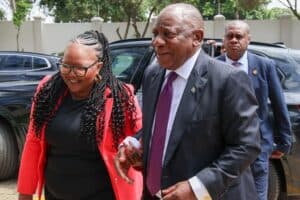Unions have questioned the president's decision on the closure of public schools as there appeared to be a difference in treatment of public and private schools.

President Cyril Ramaphosa’s announcement to close public schools for a month from Monday, July 27 only to reopen them in late August has received massive backlash with even the Human Rights Commission calling the decision regrettable and unjustifiable.
Ramaphosa during his address said Basic Education Minister Angie Motshekga had consulted with over 60 stakeholders in the sector, among them teacher unions, principal associations including school governing bodies to get to the decision.
Grade 12 pupils including their teachers would close only to return to school on August 3, while Grade 7 pupils would return to school on August 10.
While Motshekga is expected to table the mechanics on the decision, the 2020 academic calendar for universities including TVET colleges would be extended into 2021 to mitigate for the time lost during the lockdown.
Although Ramaphosa stressed that the decision to close schools, as of, July 27 was not taken lightly, the Human Rights Commission’s Andre Gaum during an eNCA interview said the decision pointed to increased learning losses, and matters such as abuse including some form of anxiety for pupils, as there remained a risk of learners being left at home.
“By 24 August, 10 million learners would have lost 50% of 100 school days.
“Now [parents] have a choice between leaving their children at home or doing their daily work. This constitutes a great problem.
“We are concerned about the health concerns. The focus should be on safe spaces in terms of health and safety.
“We don’t know when the peak will be. It seems that the peak has passed in the Western Cape. What if there are additional peaks later in the year?”
Gaum said the commission noted that independent schools were not closing and that around 43% schools – based on an individual online survey by the commission – had indicated that they would seek their own ways of paddling past the new challenges.
He stressed that some children had had no exposure to learning for months and that was unacceptable.
The commission’s stance on the closure of schools comes as unions raise concerns that the academic year will flow into the next year, which was an apparent area of concern.
While the SA Democratic Teachers’ Union (Sadtu) has partly welcomed the president’s decision on schools, the union was concerned that it seemed private schools were not affected by the break, indicative of inequality in the country.
After Ramaphosa apologised to pupils and parents for temporarily shutting schools again, the Educators Union of SA (Eusa) has welcomed the decision only to question the reopening process of schools.
“We maintain our view that schools should remain closed until it is safe to open,” said Kabelo Mahlobogwane.
“The issue of private schools not opening further exposes the inequality in schools.
“The discussion needs to be on a way forwarded. We will make sure that we do not allow our [teachers] to teach a classroom with over 35 learners.”
Meanwhile, the Congress of the People has also come out questioning the president’s decision on schools.
National spokesperson Dennis Bloem said the party rejected the decision on the closure of schools, as it clearly separated between private and public schools.
“We are very disturbed that the president of the country can stand before the nation and announce that public schools will close for a month following the advice of the World Health Organisation (WHO) and extensive consultations with various organisations. However, he has effectively split the country’s basic education system into private and public schools.
“The advice of the WHO did not say that Covid-19 will only affect public schools and private schools will be safe. It is very sad that after 26 years of democracy we must still hear of two separate basic education systems. Why? It clearly shows that the ANC doesn’t have the political will to unite our country. They are totally incapable of running the affairs of the country. If there is a decision of closing schools, it must apply to all schools.”
For more news your way, download The Citizen’s app for iOS and Android.






